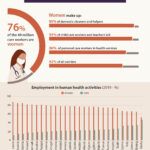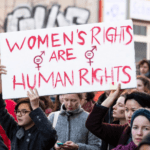The EU scores 68 points out of 100 in the Gender Equality Index, released today by the European Institute for Gender Equality (EIGE). This is a microscopic increase of just 0.6 points since last year’s edition.
“Europe has made fragile gains in gender equality. But big losses are emerging as a result of the COVID-19 pandemic. The economic fallout is lasting longer for women, while life expectancy for men has dropped. Our Index findings can help Europe’s leaders tackle the different effects of the pandemic on women and men and alleviate the unequal short and long-term impact,” said Carlien Scheele, EIGE’s Director.
Sweden and Denmark are again the top performers in this year’s Index, followed by the Netherlands, which jumped over Finland and France to claim third place. Luxembourg, Lithuania, and the Netherlands have improved the most since last year’s edition. Slovenia was the only country that went backwards. There are big variations in gender equality scores between countries. They range from 83.9 points in Sweden to 52.6 points in Greece.
“Health is the state of complete physical, mental and social wellbeing. Equal access to good quality health services, including sexual and reproductive health and rights, allows women and men, in all their diversity, to live a full and active life in society. Through the EU4Health Programme, the Commission stands ready to support EU Member States’ needs and actions to recognise every person’s fundamental right of access to healthcare as enshrined in the Charter of Fundamental Rights and the Pillar of Social Rights,” said Helena Dalli, EU Commissioner for Equality.
Spotlight on COVID-19, mental health and sexual and reproductive health
This year’s Index focuses on the links between health and gender equality – an area which the coronavirus pandemic has exposed more than ever. For example, women are overrepresented in the healthcare sector and therefore face a higher risk of contracting the virus. Healthcare workers also faced acute mental distress during the pandemic from being overworked and seeing patients suffer and die.
Men with COVID-19 were at higher risk of hospitalisation than women. This is linked to their health behaviours and pre-existing conditions such as cardiovascular disease and diabetes, which are more common among men.
Birth rates dropped, especially in countries most affected by the pandemic. Psychological distress, economic uncertainty and an increase in unpaid care work for women, led couples to delay having children — or to not have them at all. This also came at a time when sexual and reproductive health services were harder to access.
With the COVID-19 pandemic posing an unprecedented challenge to collective mental well-being and the overall health of Europe’s citizens, it’s critical that policymakers integrate gender equality concerns into health and other recovery measures to get the best outcomes for all.







Leave a Reply